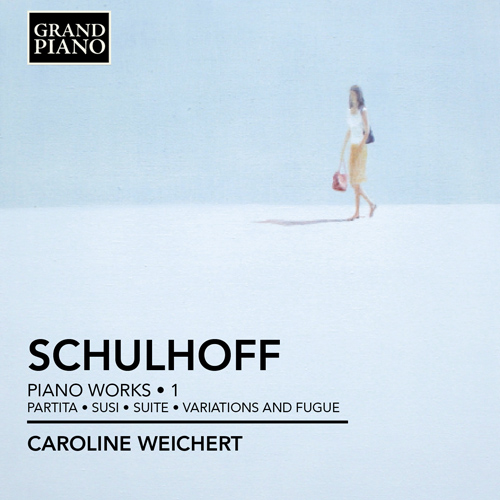SCHULHOFF, E.: Piano Works, Vol. 1 - Partita / Susi / Suite No. 3 / Variationen und Fugato, Op. 10 (Weichert)
During his short life Erwin Schulhoff absorbed a wide range of musical styles. The jazz-inspired Partita includes witty takes on the tango, foxtrot and shimmy. Further synthesis comes in the Suite No 3, written for the left hand alone, which adapts folk and jazz influences in a bracingly novel way, while the Variations and Fugue reveals indebtedness to Debussy, with whom Schulhoff studied.
Tracklist

Caroline Weichert began playing the piano at the age of six, before entering the class of her father, Gregor Weichert, when she was sixteen. She later became a pupil of Renate Kretschmar-Fischer at the Musikhochschule in Detmold, where she received her diploma in 1989. To complete her training, she studied with Conrad Hansen, Vitaly Margulis and Yvonne Lefébure.
A prizewinner at the Busoni, German Chopin and Schubert competitions, she went on to secure a double victory at the ‘young artists’ concerts’ competition, organised by the German Musikrat, which was decisive for the development of her career. Since then, Caroline Weichert has appeared regularly as a soloist with orchestras such as the Baden-Baden Philharmonie, Nordwestdeutsche Philharmonie and the Telekom-orchester. She also gives numerous recitals and chamber music concerts, showing a particular predilection for repertoires that are less often played. This is attested to by a vast discography for the Koch/Schwann label, in company with members of the NDRSinfonieorchester.
She received a Discobole award from the Académie du Disque Français for her recording début featuring works by Shostakovich. Since 1992, she has been a tenured professor at the Musikhochschule in Hamburg. Weichert’s first recording for Grand Piano, Schulhoff’s Piano Works Volume 1 (GP604), released in March 2012, received wide critical acclaim, including the prestigious Choc de Classica and Pianiste magazine’s Maestro awards.

Erwin Schulhoff was born in Prague on 8 June 1894 and showed musical ability from an early age. A musical career was decided upon on the recommendation of no less than Antonín Dvořák, and Schulhoff studied at the Prague Conservatory from 1904, followed by piano tuition in Vienna from 1906 then composition in Leipzig with Max Reger from 1908 and subsequently in Cologne with Fritz Steinbach from 1911. In the meantime he had laid the basis of a career as a pianist, while his efforts at composing were rewarded with the Mendelssohn Prize in 1918 for a piano sonata. His music up to the First World War had shown the expected influences from Brahms and Dvořák, and by way of Strauss, to Debussy and Scriabin, but four years in the Austrian army saw him adopt a more radical stance artistically and politically. In the next few years he absorbed the values of the Expressionism represented by Schoenberg and the Second Viennese School as well as the Dadaism espoused by Georg Grosz, whose advocacy of jazz was to find its way into much of Schulhoff’s music from that period.































